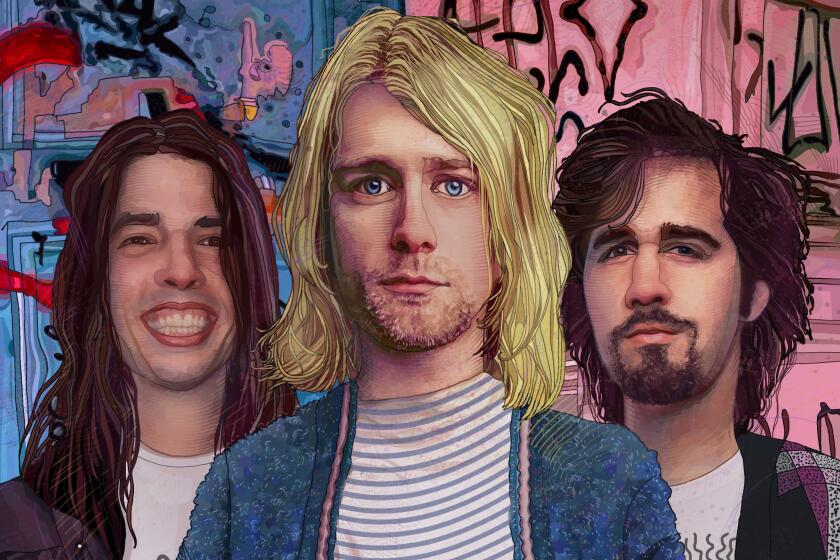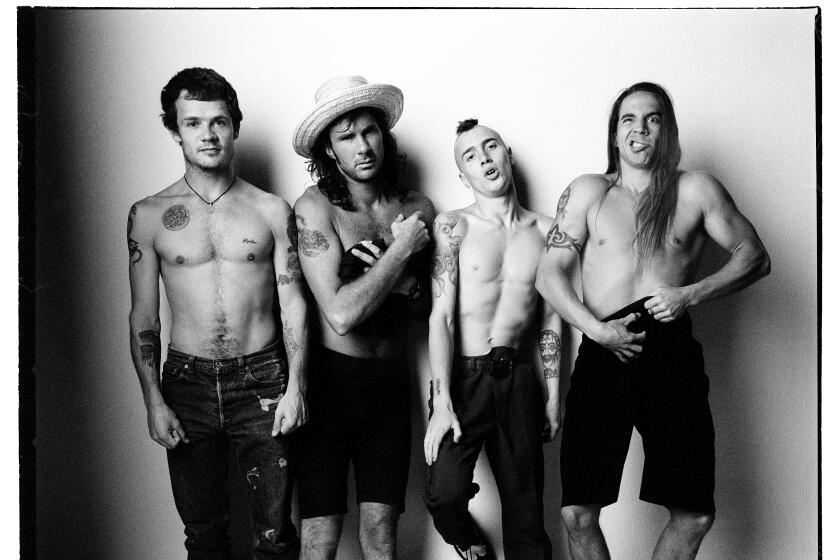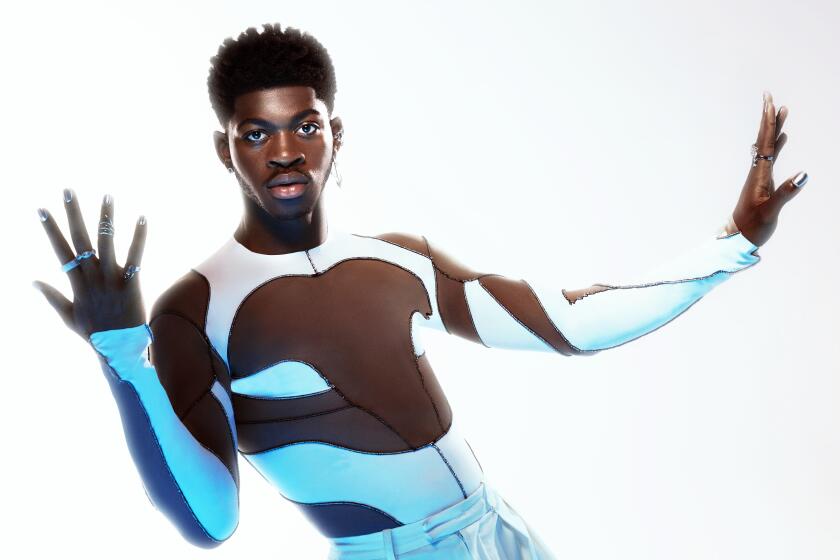‘I never talk about “Nevermind”!’: Courtney Love on the Nirvana album that changed everything
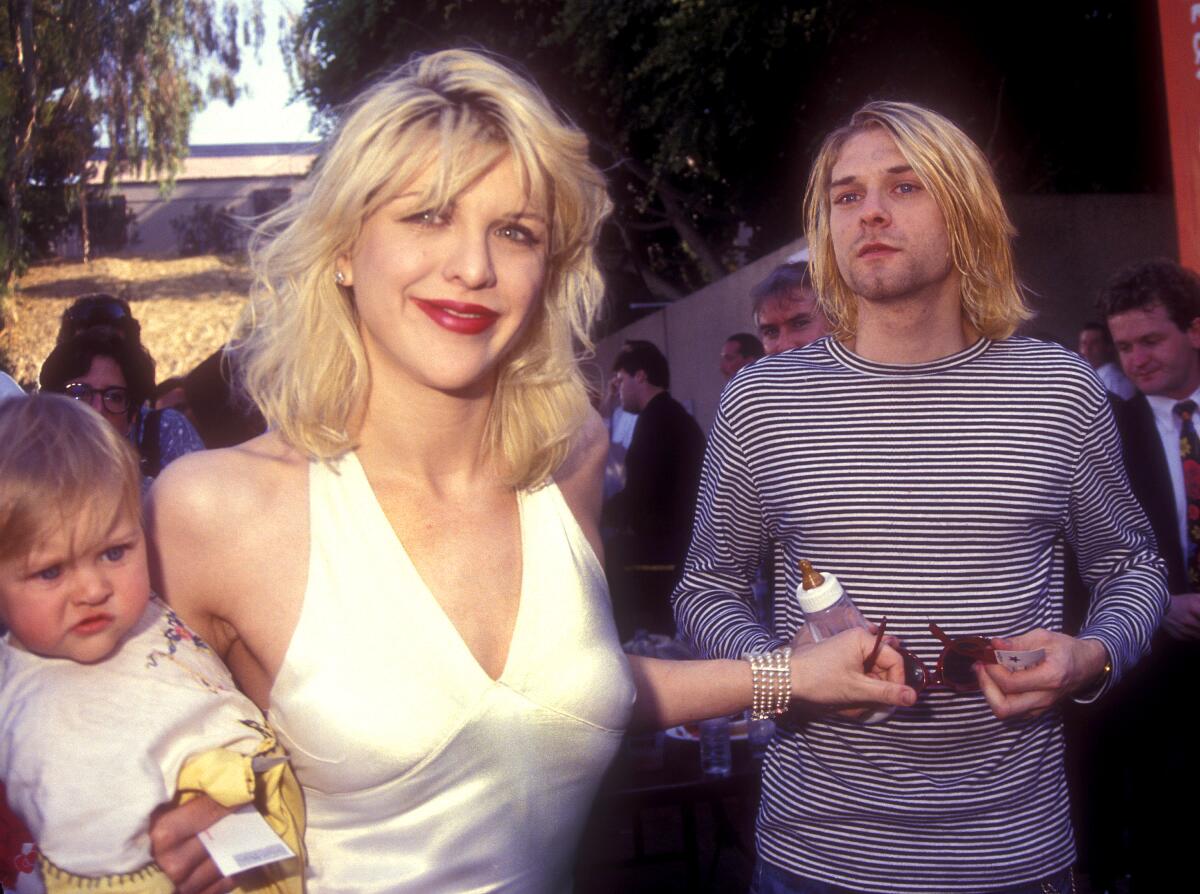
- Share via
“I’m very firmly in the club that says ‘In Bloom’ should have been the first single from the album,” Courtney Love says.
She is speaking about “Nevermind,” Nirvana’s 30 million-selling album, released 30 years ago on Friday. Love contends that Nirvana’s dizzying fame, and that of her husband, Kurt Cobain, might have at least been slowed if “In Bloom” had been released before the album’s epochal “Smells Like Teen Spirit.” And, she continues, “In Bloom” is a far better song.
“But I will admit, I am in a sparsely populated club on this.”
Legend has it that Nirvana’s ‘Nevermind’ and the grunge boom ended hair-metal careers and dominated popular music. An in-depth look back tells another story.
Love rarely has addressed “Nevermind” in the last three decades. Once she and Cobain began to date in 1991, the album’s runaway success became part of her world too. “Nevermind” was Nirvana’s second album and its major-label debut, yet no one — certainly not Kurt, not Courtney, not Geffen Records — had an expectation that “Nevermind” would achieve what it did. The label pressed fewer than than 50,000 copies to start.
Subscribers get early access to this story
We’re offering L.A. Times subscribers first access to our best journalism. Thank you for your support.
When her boyfriend became the biggest star in music, it was hard for Love to negotiate her own space. Her band Hole released its debut album, “Pretty on the Inside,” just a week before “Nevermind.” She and Kurt married in Hawaii in February 1992. Love says one of their first fights was when Kurt was rude to Stephen Stills backstage at a Honolulu show two days before the wedding. “You gotta be nice to your elders,” Love says. “Everyone had their day, and they’ve seen that day in you.”
Love, 57, has spent the pandemic in London making a new album, doting on her Pomeranian and “reading Hart Crane poetry.” When Cobain died from suicide in 1994, Love became a widow but also one of the stewards of his legacy, working with their daughter, Frances Bean Cobain, and the other Nirvana members, Krist Novoselic and Dave Grohl, now leader of the Foo Fighters. She sued the two in 2001 over finances but settled, and they all appeared together onstage at Nirvana’s 2014 induction into the Rock and Roll Hall of Fame. Some aspects of the estate, Love says, have been a “legal travesty,” but it is held together with “spit, glue and skillful diplomacy.”
Love says she often gets asked about Nirvana by random people “in train stations.” She used to reply that she “wasn’t in that band” just to not have to talk about a painful subject. “I’m trying to navigate between what is really triggering and what is not,” she says.
During a three-hour Zoom call over two days, she says it is not likely she will revisit a discussion of “Nevermind” ever again.

You’ve almost never been asked a single question about “Nevermind” itself.
I never talk about “Nevermind”! I have no idea what I’m going to say. I’m shocked it has been 30 years.
Why do you think the record has endured?
Kurt was born a Halley’s Comet. It’s a miracle the record got made and that he found a great drummer and had a bass player he could rely on. He was so happy when this record was done. He now had agency. He had the courage to change both himself and the world, and with success he became emboldened.
Is too much made of the idea of “Nevermind” being a “cultural revolution”?
I heard about [the critic] Gina Arnold. She had written some grunge book and said of it, “We won.” We won? No, he won. And we all rode his gravy train. That’s what happened.
As ‘Blood Sugar Sex Magik’ turns 30, here’s the inside story of the making of the classic album, as told by the band, producer Rick Rubin and more.
Nirvana recorded the album in Van Nuys and stayed at the Oakwood Apartments, not very far from where you were living.
I was friends with Dave Grohl first. He was dating Jennifer Finch [of the band L7]. Dave had a motorcycle and would come by and tell me about Kurt’s drum map, a sheet where Kurt had drawn out how he wanted the drums miked. I found that map later and put it in the back of my book “Dirty Blonde.” It’s gold. It will tell you exactly what kind of Neumann mike or Radio Shack mike Kurt wanted to use.
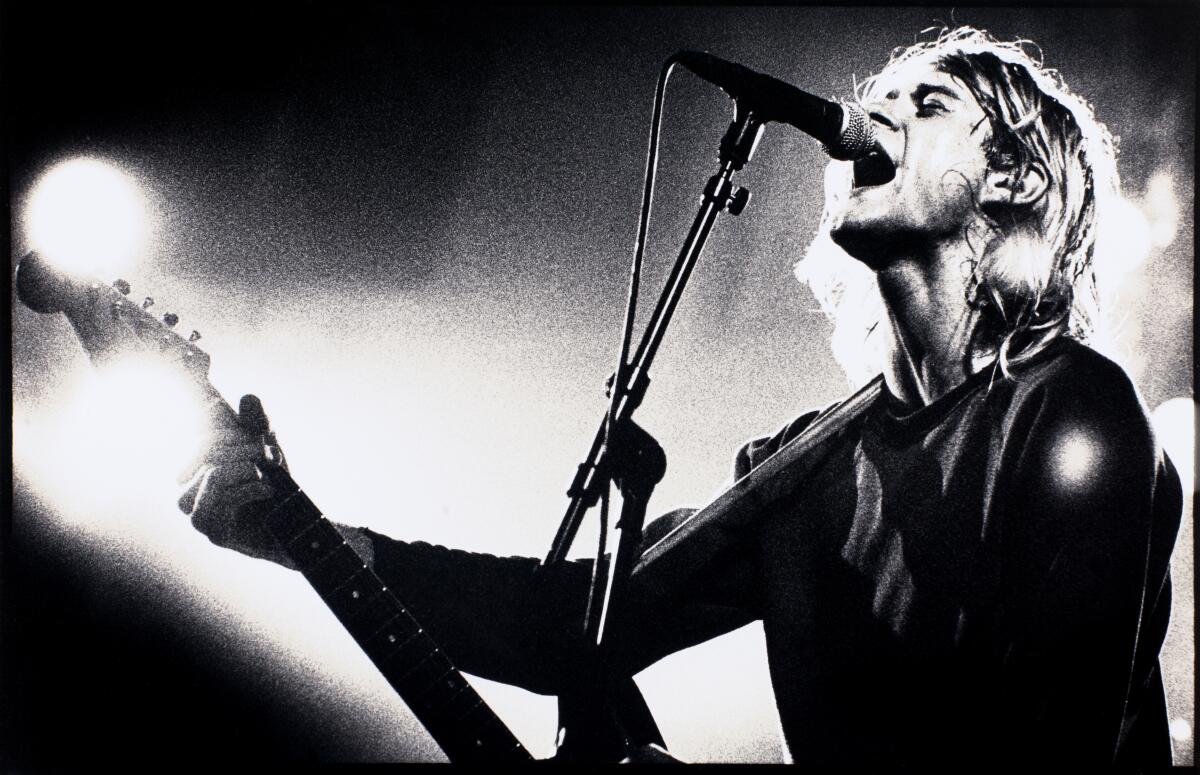
You ran into Kurt at a Butthole Surfers concert on May 17 at the Hollywood Palladium and exchanged numbers. And he called you later that same night?
Yes. He was bummed that his white Mosrite left-handed Gospel guitar had been stolen from the van that week. We started to hang out, not that night but that week.
And then we went to the movies at the Beverly Center — me, Kurt and Dave — and saw “Truth or Dare.” As we are walking out, Dave says, “That movie is you.” I said, “No, it’s you.” You got me wrong, Dave.
Did you argue to Kurt, Krist and Dave directly that “In Bloom” was a better first single than “Smells Like Teen Spirit”?
I did. Life would have turned out simpler and better had I been heard. “In Bloom” had no shtick. Although that drum fill is fantastic in “Teen Spirit,” there was a little of a K Records shtick. [K Records was an Olympia, Wash.-based independent label.] I recently saw the lyric “Who will be the king and queen of the outcasted teens” [from an early “Teen Spirit” draft] and there was a bit of the K Records vibe to that too. I am really fond of the “outcasted teens” line. I found his bad grammar, like my own, fetching.
I’m not really a fan of the idea that it all “could have” been that different, but “In Bloom” might have shifted things. He might have survived had somebody else [gone first]. Like Eddie Vedder, somebody who had good infrastructure.
What are the other songs on the album that most speak to you?
“On a Plain” is my favorite. “Something in the Way” though is one of the great rock songs of all time. The line “It’s OK to eat fish cause they don’t have any feelings” — nothing else cuts me like that line. He knows it’s a lie — here’s a guy who loved turtles — but he thinks that if someone just loves him enough, then maybe, just maybe one day he will become real. It is Kurt’s “Velveteen Rabbit.”
He is clawing his way out on “Something in the Way.” He’s telling himself anything just to get through. The other part of that song, about him living under a bridge, his mom told me later isn’t true because the river was tidal, but it doesn’t matter. The place he writes from is so emotionally desperate we all understand it.

“Polly” is a remarkable song — about the rape and torture of a 14-year-old girl, a real event Kurt read about in the newspaper — and he chose to sing it from the criminal’s perspective.
You can’t write that song today, from the point of view of the perpetrator. Kurt would definitely not be allowed to sing “Polly” today, and I think that’s pretty sad.
Early on, he told an interviewer, “I think what people can get out of the lyrics is that I’m just as confused and as frustrated as anybody else.”
I think he was being honest because he didn’t have his public persona figured out.
Who Kurt was to me was never what you saw in the public. He could be very passive-aggressive and working two agendas in public. He could say one thing and do another. He had to be like that to be a junkie, so there was that whole thing that I share too.
His musical talents aside, Lil Nas X’s startling videos and Instagram imagery have put him at the vanguard of queer iconography in the TikTok era.
“Nevermind” goes gold by October and knocks Michael Jackson out of the top spot in Billboard in January 1992. When did you first sense this was a runaway train?
In early October 1991, I had flown out to Chicago and, well, we slept together. There was this weird moment afterwards, that night, when “Teen Spirit” came on MTV. And he kind of pulled me closer.
A couple of days later, they played First Avenue in Minneapolis. The show was long over, but these kids were still in the street singing “Teen Spirit” hours later. Not the chorus, but the verses. Imagine if you are the author watching that. It was madness.
We were in Salem, Ore., when “Nevermind” went to No. 1. He cried. I cried. We were really scared.

Let’s talk more about the price he paid for what he “won.”
While this is triggering to talk about, it is joyous to remember that he got to the next place [with “Nevermind”]. He was like, “Nothing is going to stop me.” And he didn’t care what the consequences were.
The consequences though were him having to BS and say, “I didn’t want this.” To say “Corporate magazines still stuck” and pretend to hate it. He never got to be a capitalist his whole entire life. That was the consequence of this “cultural revolution.”
Here was a man who liked pleasure, who enjoyed things, and yet he wasn’t supposed to. When people say, “You are the voice of a generation,” what do you do with that?

We’ve spent several hours talking about an album he made 30 years ago, which is longer than he lived. Where would he sit with that attention?
Oh, he’d be happy about it. He was happy about the album. And I think the one after [“In Utero”] is even better, and so did he. But “Nevermind” was a cannonball. He loved what “Nevermind” was. He licked his lips and was like, “ Whoa, whoa, whoa.” But he hid it really well, so he’s attributed these saintly qualities. He possessed modesty, and he put forth this public virtue persona, and he was good at that. But he worked it. He worked it like Kate Moss works her cheekbones.
When was the first time you heard the full album, start to finish?
I was in Germany on a promo tour for “Pretty on the Inside” in October. I was in this Mercedes S-Class sedan with a Bang & Olufsen sound system, blasting down the Autobahn. Hearing it in that context was like being in an entirely different world. For a few days, we just listened to it again and again.
How do you experience “Nevermind” now?
I’m very picky when I listen to Kurt, but when I hear “Nevermind” I think of the joy he had tinkering with the drums for this glorious thing he had to say.
It’s taken me a couple of decades to realize that not only am I not as good a songwriter as Kurt, but nobody is.
Charles R. Cross is the author of “Heavier Than Heaven,” a biography of Kurt Cobain, and was editor of Seattle’s alternative newspaper The Rocket.
More to Read
The biggest entertainment stories
Get our big stories about Hollywood, film, television, music, arts, culture and more right in your inbox as soon as they publish.
You may occasionally receive promotional content from the Los Angeles Times.
